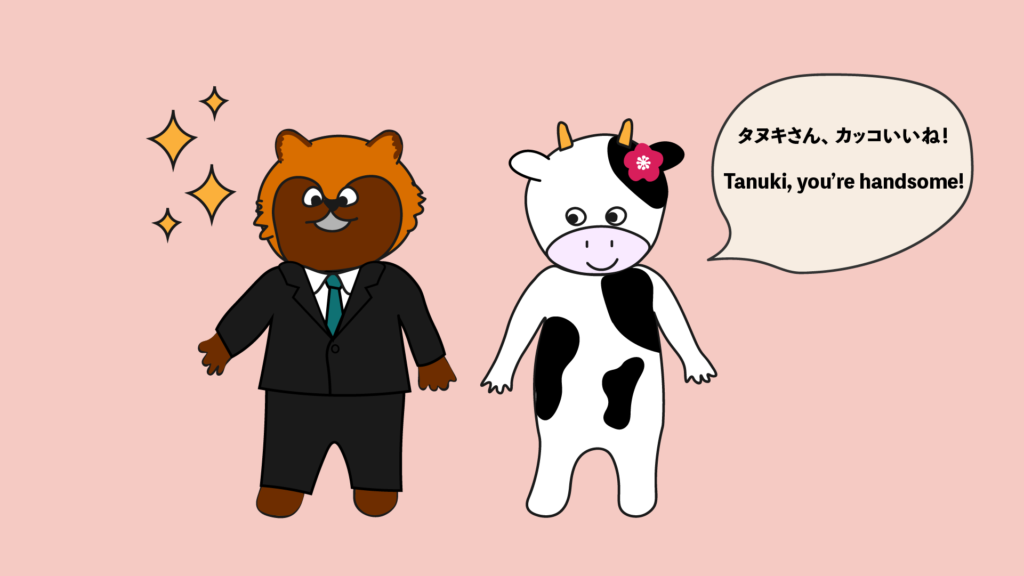How to compliment men in Japanese
Have you ever wondered how to compliment men in Japanese? Here are some phrases you can use and how to use them in Japanese culture!

Ushi-san, Tanuki’s new friend from New Year’s thinks Tanuki is very handsome!
Complimenting men in Japanese culture:
In Japanese culture, men do not regularly give compliments to other men. In general, the culture of Japanese people is reserved so they don’t show how they feel. Instead, it is more common for women to say compliments to men.
Here are some things to keep in mind:
- These compliments might make the other person think you’re romantically interested in them. Don’t use them too much if you only want to be friends
- In Japanese culture, men don’t give too many compliments. It could be awkward if you say these between men.
- Don’t be discouraged if you don’t get a strong reaction back. Japanese men can be shy. Even if they’re happy to receive your compliments, they may not show it.
Complimenting Appearance:
カッコいい – Kakko ii – Cool or handsome
When used for men, this word indicates that someone is handsome. It has a nuance of someone who’s “cool”.
タヌキさん、カッコいいね!
Tanuki san, kakko ii!
Tanuki, you’re handsome!
It’s possible to say this directly but it could be too straightforward. If you want to soften the compliment, try complimenting a clothing item, accessory, or hairstyle.
タヌキさん、今日の髪型かっこいいね。
Tanuki san, kyou no kamigata kakko iine.
Tanuki, your hairstyle today looks handsome/cool!
イケメン – Ikemen- Good looking
This is a slang word that describes men with a good looking appearance. The word comes from イケてる (iketeru), meaning “cool”, and メン(menzu) meaning either face or men. Try using this phrase to compliment men in Japanese who are very attractive!
タヌキさん、イケメン!
Tanuki san, ikemen!
Tanuki san, you’re good looking!
Ikemen is a purely appearance-based compliment. It might be weird to use directly. Instead, it’s better to use this to talk with your friends about who is “good looking”.
あの俳優イケメンだよね!
Ano haiyuu ikemen da yone!
That actor is good looking, isn’t he?!
センスがいい – sensu ga ii – Nice sense of clothing/style
This is a nice compliment to use directly to a guy! It compliments their sense of style, and will make the other person feel good.
タヌキさん、いつもセンスいいね!
Tanuki san, itsumo sensu iine!
Tanuki, you always have a nice sense of style!
モテそう – motesou – You seem to be popular with women
This is a word you can use to men who seem popular with women. モテる(moteru) means being romantically popular. If all of the women around the guy seem attracted to him, you could say this phrase. This phrase can be used with both romantic interests and men who are platonic friends.
タヌキさんって、モテそう。
Tanuki san tte, motesou.
Tanuki, you seem to be popular with women.
似合ってる – niatteru – Looks good on you
If a clothing item, hairstyle, or accessory looks good on a guy, you can point it out with this phrase. It is a complement you can use in any situation without it being awkward.
タヌキさん、そのシャツ似合ってる!
Tanuki san, sono shatsu niatteru!
Tanuki, that shirt look good on you!
凛々しい顔立ち – riri shii kao dachi – sharp looking face
If a guy has sharp/manly facial features, you could use this phrase. It’s not used as a direct complement so only use it when talking about men with your friends.
あの俳優、凛々しい顔立ちだよね。
Ano haiyuu, ririshii kao dachi da yo ne.
That actor has a sharp looking face, doesn’t he?
すてき – suteki – lovely/wonderful
Suteki is a nice way to compliment a guy you’re interested in. This phrase sounds feminine so it is not used very often by men. It has a nuance which means that they also have a nice personality, while being good looking.
今日のタヌキさんすてきね。
Kyou no tanuki san suteki ne.
You look wonderful.
決まってる – kimatteru – dressed up
If a guy is dressed-up, you can use this phrase. This means they are put together and looking very sharp.
今日のタヌキさん決まってる。
Kyou no tanuki san kimatteru.
Tanuki, you look dressed up today.
Complimenting Personality:
頼りになる – tayori ni naru- you’re dependable
In Japan, an attractive trait in men is someone who is dependable. Japanese people are a bit old-fashioned in their society so there is still an idea that women should depend on men.
タヌキさんはいつも頼りになる。
Tanuki san wa itsumo tayori ni naru.
Tanuki, you’re always dependable.
面白い – omoshiroi – interesting
Another popular compliment for men is to tell them they are interesting. If you enjoy spending time and they always make you laugh, you could use this phrase.
タヌキさん、面白いね。
Tanuki san, omoshiroi ne.
Tanuki, you’re interesting.
楽しい人 – tanoshii hito – fun person
Similar to omoshiroi, this word can be used to tell someone they’re fun! This is also a nice compliment for a guy’s personality.
タヌキさん、楽しい人だね。
Tanuki san, tanoshii hito dane.
Tanuki, you’re a fun person.
物知り – monoshiri – knowledgable
A guy being knowledgeable is an attractive trait in Japan. If you know a guy who seems to know everything you could try out this phrase.
タヌキさん、物知りだね。
Tanuki san, monoshiri dane.
Tanuki, you’re knowledgeable.
一緒にいると落ち着く- issho ni iru to ochitsuku – I feel calm when I’m with you.
This compliment should only be used if you’re already in a romantic relationship or close to being in one. If a guy makes you feel calm, you can compliment their calming personality with this phrase.
タヌキさんと一緒にいると落ち着く。
Tanuki san to issho ni iru to ochitsuku.
I feel calm when I’m with Tanuki.
How to form sentences when complimenting:
In Japanese, it is more common to omit the word “you”. This is why the example sentences above don’t contain “you” but instead use the name of the person. When trying to compliment men in Japanese, make sure to use the person’s name instead.
For example, in this phrase タヌキさん (tanuki’s name) can also mean “you”.
タヌキさん、カッコいい!
Tanuki san, kakko ii!
Tanuki, you’re handsome!
If you want to use someone else’s name, just omit タヌキさん (tanuki’s name), and add the person you want to choose. For example, if I want to use パンダさん(panda’s name) instead, I could make this sentence:
パンダさん、カッコいい!
Panda san, kakko ii!
Panda, you’re handsome!
I hope that you learned some new phrases on how to compliment men in Japanese! Have fun trying these phrases out. If you want to know how to compliment women in Japanese check out the article here.
If you enjoyed this article, check out my other Japanese language learning content like How to say sorry in Japanese: 10 useful phrases or How to say goodbye in Japanese: Beyond sayounara
Good luck with your Japanese language learning!
~Tanuki





